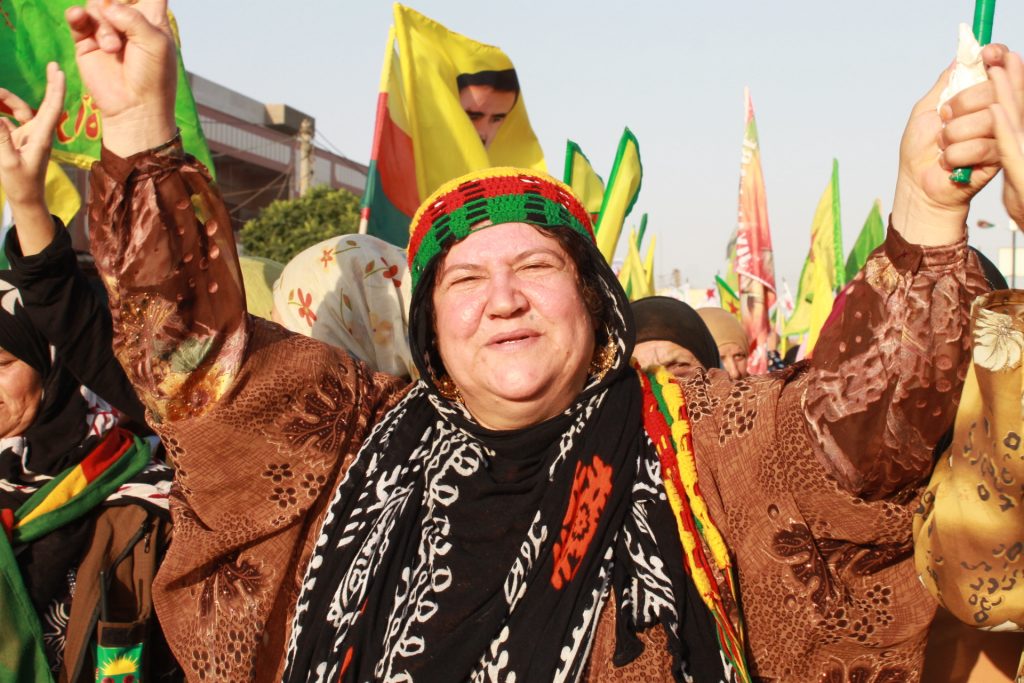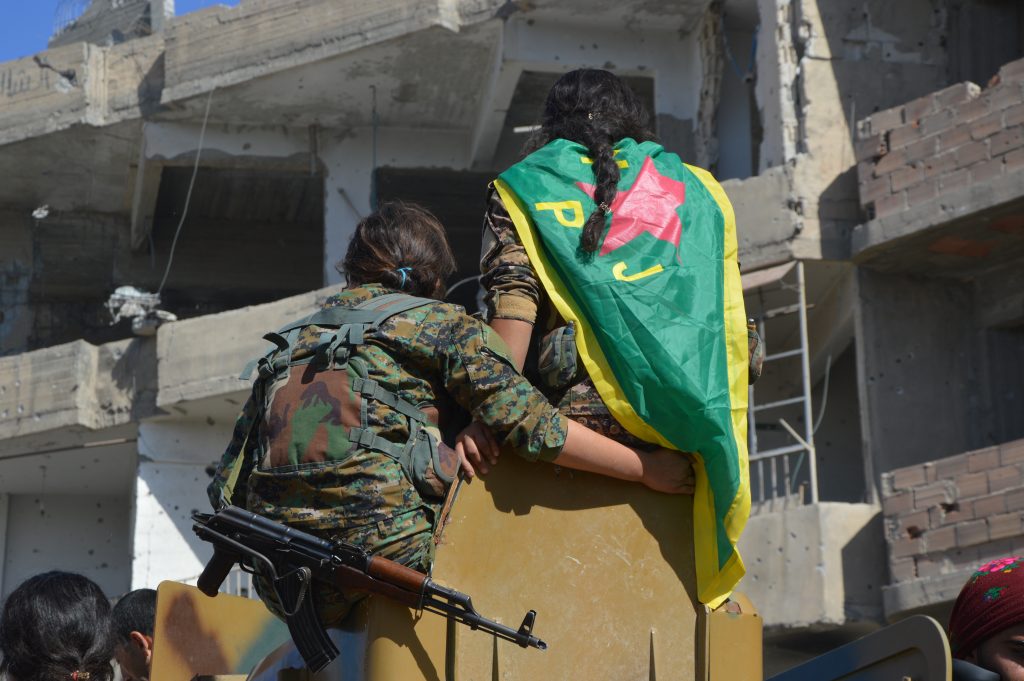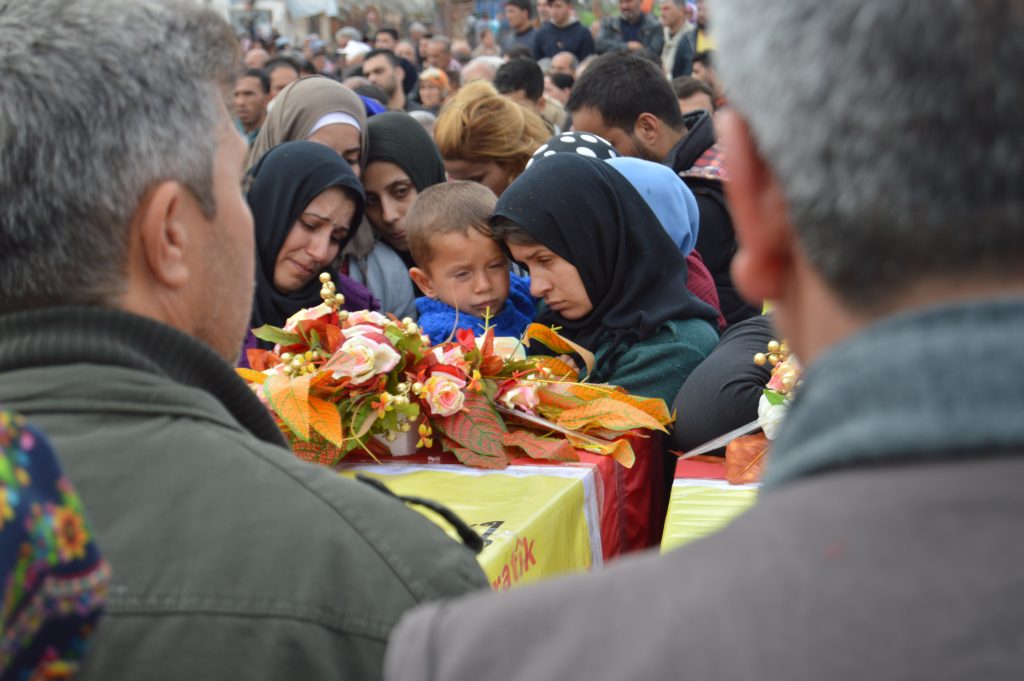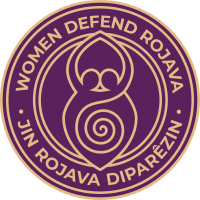“A society can not be free with out women’s liberation” (Abdullah Öcalan)

The revolution:
The oppressive Syrian government was challenged by popular protest in 2011, as was the case in many countries in the “Arab Spring”. Kurdish women in Rojava had been organising for decades. On this basis, it was possible to build up progressive changes in society. Instead of the revolution turning to cycles of violence or nationalism, the people of Rojava have created and are building up a society based on women’s freedom and gender liberation, pluralism, grassroots democracy and self-governance, and ecology. The immense achievements of the revolution have caught the world’s attention and the Rojava revolution is an example for the whole world of genuine progress towards a better future.
The Kurdistan freedom movement has a tradition of grassroots organising and challenging oppressive power structures instead of recreating them. The Rojava revolution has followed this philosophy, not basing organisation on nationalist or ethnic lines. Kurds, Arabs, Syriacs, Ezidis and all the people of the region self organise and develop their own strengths, coming together in a unity that treats diversity as strength. Together they have created the Autonomous Administration of Northern and Eastern Syria and are transforming their society at all levels. The philosophy of Abdullah Öcalan, with its proposals for democratic confederalism and women’s liberation, is the beating heart of the ethics of the revolution.
Achievements of the women’s movement
The women’s movement of the revolution puts anti-patriarchal struggle at the centre, seeing all other oppressions as stemming from millenia of gender oppression. This is developed in education and theory, but also seen in the reality of how society is organised. It is from a women’s perspective that we can most clearly see the differences created in the daily life and power structures of the people of Northen and Eastern Syria, and it is this perspective that has given some of the most inspiration to revolutionary women around the world. Achievements of the women’s movement include:
- The world famous “co-chair” system of gender equal representation at all levels.
- Autonomous women’s branches to almost all structures.
- Centres for women’s law and justice, for example the “women’s houses” to deal with domestic violence, forced marriage and related problems.
- Women’s councils.
- Women’s co-operatives.
- The defence forces of the YPJ, and the neighbourhood defence forces of the HPJ, local groups of mothers who take responsibility for community self defence.
- The development of jineoloji, a science based on forms of knowledge oppressed by patriarchy.
- Women’s education and knowledge sharing at all levels of society.

Self defence:
The revolution has shown that there is an ideological as well as military frontline. The most important thing is to continue to build up, spread, develop and deepen the ideology and values of the Rojava revolution. But that cannot be done without self defence of liberated space.
The Syrian Democratic Forces, led by the revolutionary forces YPG and YPJ, defended the territory of the revolution from the fascist ISIS threat, and liberated ISIS occupied areas in Syria. Women played a crucial role in this liberation, from the defence of Kobane to the battle for the freedom of the enslaved women of Raqqa. The liberation of Raqqa, Manbij and Deir-ez-zor have become symbols for what spreading the Rojava revolution means. In place of women’s enslavement Raqqa is now home to women’s councils, the co-chair system and space for women to self organise. Amoung the 11,000 fighters martyred to defeat ISIS’ military force were thousands of women, motivated not just by their own liberation but by freeing all women, the region and the world from the threat of ISIS. This dedication has made them an inspiration to women and anyone struggling for freedom all over the world. It is symbolised most clearly in fighters like Arin Mirkan, who gave her own life to turn the tide in a crucial moment of the battle for Kobane, and Avesta Xabur, who sacrificed herself during the Afrin war against the Turkish state, showing that the fighters of the YPJ would rather die for the cause of freedom and life than be defeated by the armies of fascism.
Turkish war on Rojava
For years the Turkish state has aimed to destroy the revolution, with no regard for international law, morality or humanity. It has made direct attacks on villages, and supported ISIS. It was supplying weapons, supplies and freedom of movement to the armies of ISIS the whole time the SDF was leading the fight against them. It continues to attack Rojava in any way it can find. This includes
- Continuing to fund and support other jihadist gangs.
- Economic embargo.
- The border wall (which was paid for by the EU).
- Attacks on villages and individuals. Turkish soldiers on the border wall have killed hundreds of people since the wall was built
- Dams and other methods of cutting or contaminating Rojava’s water supply.
- The burning of crops.
- The Afrin occupation.

Afrin war and occupation
The occupation of Afrin in March 2018, continuing to this day, is one of the clearest examples of the Turkish state’s plans for the revolution. During the Afrin war there was a global response of grassroots support, even while global powers actively supported Turkey’s fascism, or just stood by and allowed the invasion to take place.
The Turkish army and the jihadist gangs it supports continue to violate human rights every day in Afrin. This particularly impacts on women, with countless instances of rape, kidnap, and gendered violence. This is not a coincidence and we can see the enemies of the revolution understand well the connection between the freedom of society and the freedom of women.
Thousands of refugees from Afrin live in poor conditions in Shehba, asking to at least be allowed to return home, and instead under shelling from the Turkish army. Turkey has imposed demographic change in Afrin, as well as forcing Sharia law on a diverse population.
Recent developments:
In December 2018 the Turkish state declared its intention to start a new campaign of invasion and occupation targeting all other areas of Northen and Eastern Syria. Since then it has been amassing forces, continuing to fund gangs and militia, spreading propaganda against the revolution, engaging in diplomatic negotiations to prevent political recognition of the self administration, and making threats. In August 2019 Turkey once again announced it would soon “wipe out” the self defense forces and political administration and occupy the region in the name of a “peace zone”.
